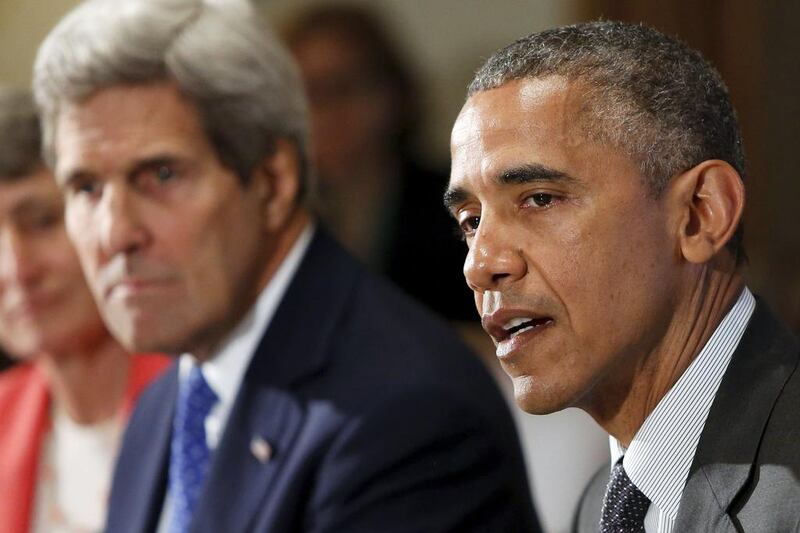In a recent interview with the London-based Asharq Al Awsat newspaper, Barack Obama said that the US is “taking a hard look” at its approach to the Israel-Palestine conflict and that he will “never give up hope” of achieving peace.
Mr Obama acknowledged the obstacles that persist in reaching a tangible solution: “simmering tensions in East Jerusalem and the West Bank, last summer’s conflict in Gaza, and serious questions about overall commitment to a two-state outcome. It’s no secret that we now have a very difficult path forward.”
It seems that the president realises that for as long as Benjamin Netanyahu occupies the helm of Israeli politics, a two-state solution will be almost impossible to achieve.
The president’s remarks come on the heels of concerning developments in Israeli national politics. Mr Netanyahu’s comment during the election campaign that there would not be a Palestinian state on his watch was the first bad omen. The second was the appointment of Naftali Bennett – a staunchly pro-settlement figure – to work alongside the Israeli PM, and Ayelet Shaked as justice minister. The latter is particularly concerning as it was Ms Shaked who called for the ethnic cleansing of all Palestinians during Israel’s 2014 offensive on the Gaza Strip. Such individuals make it very difficult for Mr Obama to achieve peace between Palestine and Israel.
Mr Obama’s recent comments hark back to Cairo in 2009 when he filled the hearts of many Palestinians with joy as he gave an unprecedented recognition by a US president of the “pain of dislocation” that “they have endured for more than 60 years”. In his speech, Mr Obama challenged the “legitimacy” of Israel’s continued settlement expansions.
However, despite the indefatigability of US secretary of state John Kerry, the peace plan never took off. Mr Netanyahu refused to stop settlement building. Israeli arbitrary incarcerations of Palestinians have increased and, finally, the PA has pursued member status at the UN, frustrating US efforts. In the eyes of many Palestinians, Mr Obama’s Cairo promise has faded.
Former European leaders have also written a hard- hitting letter to the EU foreign minister Federica Mogherini, saying that Mr Netanyahu’s reelection “demands a new policy” from the EU towards the occupied territories.
The letter is explicit in its recommendations that the EU take a decisive role in moving peace negotiations forward by moving away from “a reluctance to get out in front of the US in an area where Washington has always insisted on prime ownership”.
The letter links global issues to questions of legitimacy in the stillborn negotiations: “The fact that American efforts, over more than two decades have achieved virtually nothing by way of justice for the Palestinians or long-term security for Israel means that European interests have also suffered.”
It closes with policy recommendations for what it calls “a fresh approach” that include “efforts to persuade Hamas and other Palestinian factions intent on armed struggle to take a political and non-violent line from now on”.
The EU has long been seen as championing a more impartial role than the US in the peace negotiations.
This month, the Vatican also effectively recognised the Palestinian state, while stressing that it has long recognised its legitimacy. The Pope himself has made habitual references to “the state of Palestine”. The Vatican has expressed its “hope for a solution to the Palestine question” and an end to the conflict “according to the two-state solution”.
Israel has expressed its consternation, saying it was “disappointed” by the Vatican’s decision, and that “such a development does not further the peace process”.
The news that another European territory is playing a significant part in the resolution of the Palestine-Israel conflict not only further highlights Mr Obama’s idleness, but suggests a possible shift in the leadership role of a conflict in which the US has traditionally played the part of the dominant intelucutor.
During his interview with Asharq Al Awsat, Mr Obama said “we’ve worked so hard over the years for a two-state solution to develop innovative ways to address Israel’s security and Palestinian sovereignty needs”. Yet, Palestinian outrage at Mr Obama’s material and diplomatic support for Israel, coupled with his inability to yield a solution to the conflict, means that any further promises are likely to be seen as just more hot air.
Given the dissolution with US-led talks, and the coming to power of a hardline right-wing Israeli government, Palestinians and their supporters may start to turn down new avenues for help. Perhaps the EU could breathe life back into what are now seen as the defunct Israel-Palestine peace negotiations.
Matthew Ayton is a freelance writer and researcher in the West Bank





